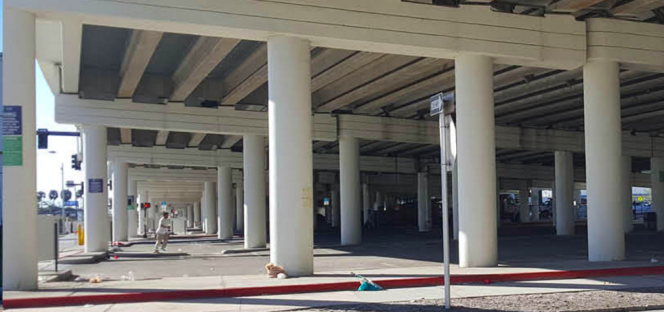Grassroots advocates in Tampa are going up against Florida DOT in a standoff with huge implications for the future of the city.
FDOT is pushing a massive regional highway expansion scheme, known as Tampa Bay Express, that would add 90 miles of tolled lanes over five counties. The plan contains nothing for transit, nothing for walkability. It's a cars-only mega-project dreamed up 20 years ago that will uproot local residents -- mostly in black and Latino neighborhoods.
The members of Sunshine Citizens, meanwhile, have a very different vision. They want the region to be connected by multiple modes of transportation, with good transit options and walkable neighborhoods. For two years, Sunshine Citizens leader Michelle Cookson and other volunteers have been organizing protests, packing meetings, and demanding a better solution from FDOT
Opposing a highway mega-project is always hard work. You have to take on a lot of people who stand to make a lot of money. But Cookson isn't giving up. "We will not stop," she told Streetsblog in an interview. "The people have had it."
Advocates have made breakthroughs and suffered setbacks in the past year. In June, the Tampa City Council voted to remove the highway expansion from the list of projects in the Hillsborough County Metropolitan Organization's long-range plan.
Later that month, hundreds of people opposed to the highway expansion packed a meeting of the MPO that ran until 2 a.m. But the agency went ahead and kept the project in the long-range plan.
Then in December, FDOT project leader Debbie Hunt, who had become the public face of the project, "abruptly resigned," according to Florida Politics. FDOT Secretary Jim Boxold called for hitting the "reset button" on the project.
But to advocates' chagrin, FDOT's idea of a "reset" could be worse than what it replaces.
Earlier this month, for instance, FDOT unveiled a "new vision" for the Howard Frankland Bridge, a highway bridge that connects Old Tampa Bay and St. Petersburg and needs to be replaced. The agency's new "vision" calls for an even wider bridge than the old plan, to avoid replacing lanes that are currently un-priced with toll lanes.
Bill Jones, FDOT's current local lead on the project, paid lip service to the idea of a "reset" in an address to the City Council, promising "enhanced collaboration" with the public and a "comprehensive transportation vision."
But Cookson and other advocates aren't satisfied. The plan still widens highways through neighborhoods like Seminole Heights and West Tampa, ripping up at least 150 properties and offering nothing in return.
"A lot of the public has looked at this plan and said they don’t like it," Cookson said. "We all agree we need a better transportation solution. Where we’re in disagreement is that FDOT says this is the only thing we can have -- it’s roads only."
Cookson wants the state to go back to the drawing board and develop a different long-range approach to solving transportation problems.
"We can do better," she said. "We know where we want to go next -- it’s a transportation system, it’s not a widened highway."






